The blueprint of our personality is imprinted on us from the day we are born. This primitive personality will mature over the years, and some areas will flourish more than others will. Understanding how our minds and personalities work has always been a topic of interest. One of the most popular personality tests in the world is the Myers Briggs Test, used by 88% of all companies as a hiring tool.
The Myers Briggs Test, also known as the MBTI quiz, was designed by Catherine Briggs and Isabel Briggs Myers. This mother and daughter duo were not famous psychologists, but they became interested in studying people’s personalities. Briggs’ work was based on the theories of Carl Jung on the four dichotomies that design our personality. The first version of the test was published in 1944, at a time the world was at war, the Briggs’ thought the test would help women find jobs that were fitted for them, since women labor was needed during World War 2. For the next 50 years, the test was modified until the version we have today. The MBTI quiz contains over 80 questions in the European Union version, and over 90 questions in the American version. Certified professionals are the only people allowed to administer and interpret the results of the test, but similar quizzes can be found online.
Carl Jung believed that humans experience the world using four different functions. These functions are the dichotomies:
| Extroversion vs Introversion | Sensing vs Intuition |
| Thinking vs Feeling | Judging vs Perceiving |
The Briggs duo took these dichotomies and designed a test to determine on which side each person will stand. The combination of the four sides create a personality type represented by four letters.
| Extrovert | Introvert |
| Sensing | Intuition |
| Thinking | Felling |
| Judgement | Perceiving |
There are 16 personalities, each of them have qualities and strengths. To determine the personality type, the test ask four main Myers Briggs questions:
1. Where do you get your energy?
This question pairs with the dichotomy of extrovert vs introvert. This is a hot topic in the discussion of personality psychology and almost every personality quiz evaluates it.
Being an extrovert does not mean that you want to party or be social all the time. Extroverts get their energy from interacting with the outside world. Extroverts tend to interrupt conversations just because they get excited and need to intervene; they recharge through human interactions like talking to strangers, going to meetings, and doing group activities. According to studies, extroverts represent 75% of the world population.
Introverts are not shy and secluded; they get their energy from self-reflection. You can still be a social person, and be an introvert. They recharge by being isolated, and have a chance to think in silence. Being surrounded by people can be draining for introverts, and they will do better with smaller groups of people or with people that they love and already know. Introverts tend to be misunderstood since they only represent 25% of the world population.
2. How do you take in information? How do you see the world?
This question pairs with the dichotomy of sensing vs intuition
The sensor is a person psychologically more in contact with their senses and tends to do one thing at the time. Because the body is focused on taking all information from the surroundings, everything that sensor people do is extremely detail oriented and meticulous. Sensors are sequentially evaluating issues one by one, focusing only on what is in front of them and not thinking about anything outside the box.
For the intuitive, sensing is like gunpowder that gets the fire going, but it will eventually fade away. Intuitive use their senses to get them going but they complement with what they call a sixth sense that guides them and helps them read between the lines. Intuitive people have hunches; they are conceptual, roundabout, strategic, big picture oriented and idealistic. Intuitive people are drawn by what is over the horizon and are bored by day-to-day life.
3. How do you make a decision?
This question pairs with the dichotomy of thinking vs feeling.
Thinkers are reasoning within objectivity, which allows them to focus on logical inconsistencies. What defines a thinker is logic. Thinkers have feelings but they do not use them to solve problems. They tend to be aggressive in decision-making, they are assertive and like to argue and debate. Thinkers are often misunderstood, because they do not consider the feelings of people around them or their own and they will tell you information even if they know it will hurt your feelings. Most men score as thinkers (65%) in the Myers Briggs test.
Feelers are subjective. They are defined by harmony; feelers are able to be logical but are secondary to their feelings. If a feeler person believes that by giving you certain information they will hurt your feelings they will choose to lie or hide the information. Typically to buy time to word it differently or have someone else do it. They are capable of arguing, debating and communicating hard information but feelers do not want to do it. Feelers tend to take things more personally and are highly empathetic and compassionate. Majority of the women (70%) test as feelers in the Myers Briggs test.
4. How do you organize your world? How do you get things done?
This question pairs with the dichotomy of judgement vs perceiving.
People that test higher for judgement are not judgmental; this only means that psychologically they prefer closure, organization, and structure. They are better with rules, time lines, processes and authority. Judgers feel uncomfortable when they are late and when they are surrounded by clutter. They like to do things ahead of time, and are considered planners. When changes happen unexpectedly, judgers are not easy going and might take a while to adapt. 50% of the planet are judgers.
Perceptive people are psychologically wired to wait and see what is going to happen instead of planning ahead of time. They are flexible, spontaneous and easy going. Perceptive people adjust easily and tend to do things at the last minute. They walk slower, procrastinate, and can be late. The strength of the perception is that they can think outside the box, solve crises quickly, and adapt.
Everyone has a dominant process that will determine how you act and behave; this is why the Myers Briggs test is a great way to evaluate each individual to determine the best possible work partners and relationship dynamics.
Probably as you read, you identified yourself with one of the poles of each dichotomy. For example, my Myers Briggs test results are INFP (Introvert-Intuitive-Feelings-Perception).
This test will give you tools and help you understand how you interact with the world around you, allowing you to make better decisions about your day-to-day life.You can take the Myers Briggs test here: https://www.onlinepersonalitytests.org/personality-test/enfp/





